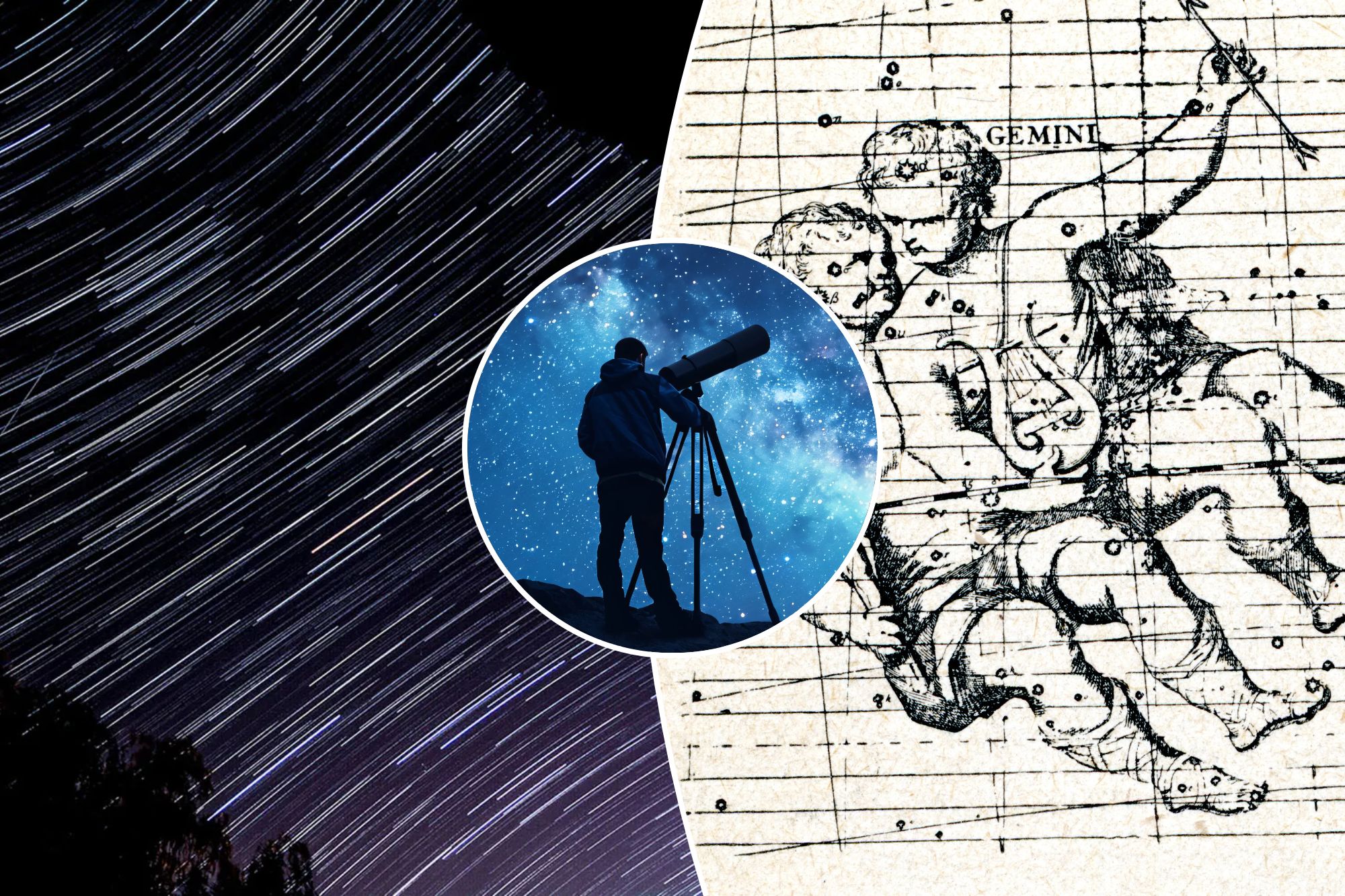
Find the darkness and collect your wishes, my babies: the annual Geminid meteor shower is upon us.
Gemini is the best and most reliable of the annual meteor showers—but this year, the waxing full moon in Gemini may interfere with optimal viewing.
Although the ever-loving moonlight will obscure some fainter meteors, the bright baddies will still be visible—and definitely worth looking up.
What is a meteor?
Meteors are born from comet particles and asteroid debris. When this glorious remnant travels around the sun, it leaves a trail in its wake.
When Earth passes through those paths, bits of space dust collide with our atmosphere and burn up on their own, and their breakup creates streaks of color and fire in the sky.
Gemini is the early bird meteor shower as the sun sets in early December, and the constellation Gemini — from which they appear to originate — rises roughly an hour after nightfall, making the meteors visible relatively early in the evening.
While most meteors appear colorless or white, Gemini is cast against the sky with a yellow or green hue, enhancing the viewing experience.
When is the Geminid meteor shower?
Gemini comes every year, blessing us with their brilliance from mid-November to mid-December. In this rotation, precipitation will peak the night of Friday, December 13, into the early morning hours of December 14.
Look for more meteors hourly starting around 9pm with a crescendo at 2am and then dropping off at a rate of one or two per minute.
Mythology
The Gemini Ray, or point in the sky where they appear to originate, is the Gemini constellation for which they are named. This is not the source of the meteors, but a visual indicator of them.
The constellation Gemini is associated with the myth of the mythological twins Castor and Pollux.
Gemini reminds us of the importance of intimacy, sacrifice, and a walk-or-die willing to give up forever for society, while also reminding us that we are made of stardust and to stardust we must return.
Castor was the mortal son of King Tyndareus and Pollux, the immortal offspring of Zeus, an ancient example of heteropatric superfecundation. (Google it; I’ll wait.) Handsome and tough, the brothers were inseparable, fighting, sailing the seas, and swearing absolute loyalty to each other.
When Castor was mortally wounded in battle, Pollux, mad with grief, begged his father Zeus to save him.
Zeus, a tranquilizer pater familiasshared their changing fates and gave them both a deathless death – choosing to place the twins in the night sky, where they burn bright and side by side.
Metaphorically, Gemini reminds us of the importance of intimacy, sacrifice, and a ride-or-die willing to surrender forever to society, also given that we are made of stardust and from stardust we are bound to let’s go back
What is the difference between a comet and an asteroid?
Unlike most other meteor showers that originate from comets, the Geminids originate from the asteroid 3200 Phaethon, named after Phaethon, son of the sun god (name of the large group) Helios, who borrowed his father’s chariot for the purpose catastrophic.
The difference between a comet and an asteroid, you ask?
A comet, according to Earth Sky, is “a dirty snowball with a solid core covered by a layer of ice that sublimates (turns from a solid to a gas) as the comet approaches the sun. Comets revolve around the sun in elongated orbits, going close to the sun and then away from the sun.
Conversely, and perhaps less poetically, an asteroid is a rock whose orbit around the sun is circular.
Like the demigod for whom he is named, Phaethon is difficult to define. Per NASA: “It is possible that Phaethon is a ‘dead comet’ or a new type of object being discussed by astronomers called a ‘rocky comet’.”
Where to see
The Geminid meteor shower will be visible across the globe, with maximum visibility in the Northern Hemisphere.
The best practice for observing meteors is to find a place as far away from man-made lights as possible. Since many of us in the Northern Hemisphere will be under the chilly climes of winter weather, bundle up, bring a hot drink or a glove warmer and settle in for the spectacle.
For those who get cold easily, consider a sleeping bag, weighted blankets, long underwear, or a consensual cuddle pool.
How to watch
Under clear skies and away from the maddening glare of light pollution, the Geminids will be visible to the naked eye. While many people will reach for a telescope or binoculars, it’s better to take in the whole sky than a small part.
Meteors can and will appear anywhere in the sky.
However, the moon will be 92% illuminated by the time the Geminids peak. Thus, your best bet for a shower appearance is to face away from the moon and toward the darker part of the sky.
After about 30 minutes, your eyes will adjust to the dark.
Avoid looking at your phone during the meteor shower, as it will impair your night vision and disrupt your ancient connection to the above and beyond.
If you can’t catch the show this weekend, fear not – Gemini will continue to grace the skies until Christmas Eve.
Look up, wish well and feel the gravity of being cosmic and creaturely, infinitesimal and infinite.
Astrology 101: Your Guide to the Star
Astrologer Reda Wigle researches and irreverently reports on planetary configurations and their effect on each zodiac sign. Her horoscopes integrate history, poetry, pop culture and personal experience. To book a reading, visit her site.
#Geminid #meteor #shower #peak #week #heres #big #sky #show
Image Source : nypost.com